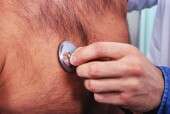(HealthDay)—A combination of testosterone and fenofibrate may offer men with high cholesterol and late-onset hypogonadism the most cardiometabolic benefit, according to a study published online May 29 in Cardiovascular Therapeutics.
Robert Krysiak, M.D., Ph.D., from the Medical University of Silesia in Katowice, Poland, and colleagues evaluated three age-, weight-, and lipid-matched groups of older men with atherogenic dyslipidemia and late-onset hypogonadism. The groups were treated with oral testosterone undecanoate (120 mg daily; 15 patients), micronized fenofibrate (200 mg daily; 15 patients) or testosterone plus fenofibrate (18 patients). Plasma markers were assessed before and after 16 weeks of therapy.
The researchers found that testosterone undecanoate tended to decrease high-sensitivity C-reactive protein (hsCRP) and improve insulin sensitivity, as well as increase plasma testosterone and reduce high-density lipoprotein (HDL) cholesterol. Fenofibrate alone increased HDL cholesterol and plasma levels of homocysteine, while reducing triglycerides, insulin resistance, circulating levels of uric acid, hsCRP, and fibrinogen. Fenofibrate administered together with testosterone yielded the strongest effect on testosterone, homeostatic model assessment 1 of insulin resistance ratio, uric acid, hsCRP, and fibrinogen. The combination of testosterone plus fenofibrate did not unfavorably affect HDL cholesterol and homocysteine.
"Our study shows that fenofibrate produces a stronger effect on cardiometabolic risk factors in men with late-onset hypogonadism and atherogenic dyslipidemia than oral testosterone undecanoate," the authors write.
More information:
Abstract
Full Text (subscription or payment may be required)
Copyright © 2015 HealthDay. All rights reserved.





















